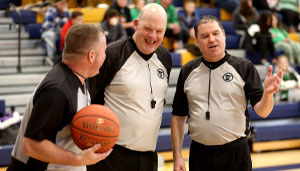Playing Time Should Be Addressed Before Start of Season
By Kyle Elmendorf on November 07, 2014 coaches PrintWhat is the hardest thing for players and parents to understand in sports? Most would probably agree that the subject of playing time presents the biggest challenge. Playing time is not equal for all athletes and can destroy a team if the coach allows it.
The coach has the most responsibility when it comes to handling playing time. There are key things a coach should do to make sure that everyone is on the same page. Although these guidelines could be applied to many sports, let’s use high school basketball as an example.
My experience in coaching basketball includes nine years at all three high school levels: Freshman, junior varsity and varsity. For the past six seasons, I have sent a packet to parents at the beginning of the year which includes a personal letter and program information. In the letter, I explain that playing time will not be equal among the players. The letter also states that if they are interested in getting the most playing time – or equal playing time – high school sports may not be for them. If they are interested, I help them find a recreational league for their child.
Before I send the packet home, I meet with the team to review our objectives, goals and policies. I then meet with each player individually. Players are told to go home and share this information with their parents, including what their role is at this point and what they need to do to get better. Parents then detach and sign the form stating they have read the packet and discussed it with their child. In the packet, I also discuss how winning is not everything, the life lessons we will teach, and how learning and accepting roles will be a valuable skill for the workforce. I feel it is extremely important to have these conversations early in the season.
As the coach it is my responsibility to meet with each player individually to discuss what I see their role being on the team. It is important that we discuss what the player needs to do in order improve their game. I do this at the beginning, middle and end of the season. Players need constant constructive feedback, and I aim to provide that.
Each season brings new players and roles. Just because one year I played seven players regularly doesn’t mean it will always be that way. My job as a coach is to put players in the best position to help the team win. Winning is not the end all and I teach that to my players, but it is a major goal. As coaches we need to prepare our athletes for life. Sports offer the perfect opportunity because being on a team provides many examples of how teamwork, leadership and taking on roles will help in the workplace.
I have been fortunate to never really encounter a big dilemma or issue when it comes to players or parents being upset with playing time. I am certain that both players and parents have not agreed with me when it came to playing time, but I think it has helped to be up front and honest about my philosophy and the roles each kid has on the team. Coaches have to be up front and honest about this; if they are not, it will come back to bite them later in the year.
Aside from coaches, parents must also understand how playing time works for their child and for the team. It is natural for parents to want to see their child play as much as possible. As I parent I understand that we all love our children and just want to see them play. I understand how hard it is for parents to see their child not play and be unhappy. I agree that all kids involved in youth sports should play. Winning is not as important in the youth and middle school ages; participation and involvement of all team members is the most important factor at this age. However, once kids reach high school age, playing time issues often arise.
The question parents should ask first is why should my kid play more? Coaches have many things to weigh when making decisions on who plays and how much. Things such as age, experience, adjusting to new levels of play, and having players in front who are bigger, stronger and faster are just a few. Too often, parents become so caught up in wanting their child to be the star that they do not step back to see the larger picture.
If parents are unhappy with the playing time their child is receiving, they should ask for a private meeting with the coach to share their concerns. Parents should not bash the coach in public; it does no good for anyone. If a student is upset about playing time, he or she should speak to the coach first. Parents should not join their child in ripping the coach as this will lead to a negative attitude around the team and will not help the athlete get more playing time. Always offer support and encouragement to your child, but never fill them with false hopes that lead to disappointment.
A final factor in the equation is the players themselves. It is important for players to understand their roles, and to be willing to ask key questions of themselves and their coach. First, players should ask their coaches what they see their roles being on the team and what they need to do to improve. This should be done early and often throughout the season. Coaches love players who ask questions and who show they are willing to work hard to improve.
Players who are unhappy with your playing time should ask the following questions:
-
Am I the first one to practice and the last one to leave?
-
Do I give 100% effort 100% of the time?
-
Do I bring effort and energy to practice every day?
-
Do I support my teammates and show it?
-
Do I ask questions?
-
Do I show up in the offseason?
-
Do I defend and rebound? If you can defend and rebound, a coach will always find room for you in the rotation.
Playing time is a sensitive topic because emotions too often get the best of the parties involved. I firmly believe that if coaches, parents and players take the advice from this post and use it that playing time becomes a non-issue. I believe things will work themselves out and all parties involved will clearly understand the roles needed to have a successful season.
Kyle Elmendorf
Kyle Elmendorf is in his ninth year as a teacher and coach at Orchard Farm High School in St. Charles, Missouri. He is the head girls basketball coach and assistant football coach.
Most Recent Articles
- nfhs news NFHS Learning Center Delivers 25 Millionth Course
- Track & Field/Cross Country article Effective Communication with Athletes and Coaches
- nfhs news Player Equipment Changes Highlight 2025 High School Football Rules Revisions
- Player Equipment Changes Highlight 2025 High School Football Rules Revisions
- nfhs news Judgment Call on Second Contact Eliminated in High School Volleyball






